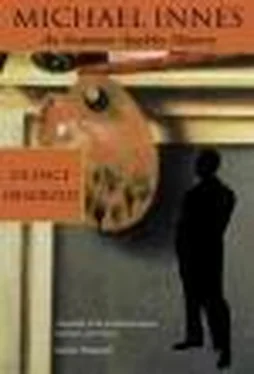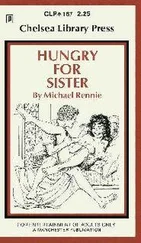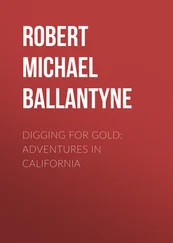Michael Innes - Lament for a Maker
Здесь есть возможность читать онлайн «Michael Innes - Lament for a Maker» весь текст электронной книги совершенно бесплатно (целиком полную версию без сокращений). В некоторых случаях можно слушать аудио, скачать через торрент в формате fb2 и присутствует краткое содержание. Жанр: Старинная литература, на английском языке. Описание произведения, (предисловие) а так же отзывы посетителей доступны на портале библиотеки ЛибКат.
- Название:Lament for a Maker
- Автор:
- Жанр:
- Год:неизвестен
- ISBN:нет данных
- Рейтинг книги:4 / 5. Голосов: 1
-
Избранное:Добавить в избранное
- Отзывы:
-
Ваша оценка:
- 80
- 1
- 2
- 3
- 4
- 5
Lament for a Maker: краткое содержание, описание и аннотация
Предлагаем к чтению аннотацию, описание, краткое содержание или предисловие (зависит от того, что написал сам автор книги «Lament for a Maker»). Если вы не нашли необходимую информацию о книге — напишите в комментариях, мы постараемся отыскать её.
Lament for a Maker — читать онлайн бесплатно полную книгу (весь текст) целиком
Ниже представлен текст книги, разбитый по страницам. Система сохранения места последней прочитанной страницы, позволяет с удобством читать онлайн бесплатно книгу «Lament for a Maker», без необходимости каждый раз заново искать на чём Вы остановились. Поставьте закладку, и сможете в любой момент перейти на страницу, на которой закончили чтение.
Интервал:
Закладка:
Gylby stared at me. ‘A madman’s dream.’
‘Exactly – a madman’s dream. And your first impression of Ranald Guthrie was that he was mad.’
‘Good God!’
‘Your ejaculation is almost justified. It is a most horrid picture. Ranald Guthrie committed suicide – and in the same instant an abominable crime. Having got that we have got to the core of the mystery. It remains to work it out in detail.
‘Guthrie would not let Lindsay have his niece: we must begin, I think, with that as a fact of pathological intensity. And for some reason his hatred of the young man was so extreme that he plotted – having failed, perhaps, to achieve his end in other ways – to prevent the thing by Lindsay’s death – and his own. Remember he was of a more than melancholic temperament, with that deep will-to-death which is the ground of so many apparently unmotivated suicides. Actually, he once attempted suicide – I was fortunate enough to secure evidence of that yesterday – and we must imagine him contriving an act in which these dominant impulses would be telescoped. He would rob Lindsay of his niece by a method that meant nothing less than Lindsay’s ignominious death at the hands of the law; at the same time he would satisfy his own obscure and profound craving for self-destruction. You can see why he chanted Dunbar’s poem and why the fear of death was upon his face: he knew he was going to die. You can see why he gave signs of struggle; why, as Miss Mathers said, he seemed “in two minds”. No man could meditate such a deed without moments of terror and revulsion.
‘There was to be a crime – and a witness. There was to be the best sort of witness – a medical witness.’
‘Hardcastle’s doctor!’
‘I think so. The first thing that went wrong was that this doctor – whoever he be – failed to turn up. You and Miss Guthrie turned up instead. And Guthrie decided that you would serve. Hence his look of calculation as he considered you. Hence his significant remark that he was very glad you had come.
‘I believe there is another trace of the original plan in the circumstance that Guthrie feigned illness next day. That was somehow to be exploited to get the doctor to the right place at the right moment – everything was to turn on that – and it was a fragment of the plan which for some reason he adhered to even when the doctor – daunted, we may guess, by the snows – had to be replaced by yourself.
‘And now the plan. It was really very simple. Lindsay was to come on Christmas Eve and take Miss Mathers, together with her dowry, quietly and indeed secretly away. Guthrie’s eccentricity, his insistence that the marriage was disgraceful and so on, was enough to give a natural colour to this. Lindsay and Miss Mathers would see that he was determined to humiliate them by such an arrangement, but they would suspect nothing more. Nor should we at this moment have the least notion of what had been arranged but for the chance of Miss Mathers having managed to send a letter to an old friend in Kinkeig. Save for this circumstance, which Guthrie didn’t reckon on, there would only have been the word of the fugitive that Guthrie had ever sanctioned their departure, or that he had given Christine a sum of gold.
‘Lindsay was to be brought up to the tower for a final interview with Guthrie – and at a set moment he was to be dismissed. And dismissed in a particular mood. I suppose Guthrie knew the lad’s temperament, and knew how to lash him – Miss Guthrie’s word – into a flaming passion before telling him to go.’
‘Mr Wedderburn, the man was a fiend!’
‘You barely exaggerate. And you see what actually happened. Summoned by Hardcastle, you came up the tower staircase just in time to meet that very angry young man face to face. He pushed past you unheeding – you remember that Hardcastle made a noticeably ineffective attempt to stop him – and suspecting nothing. Then he simply joined Miss Mathers and together they shook the dust of Erchany from their feet. And meantime – the moment, indeed, that Lindsay was through the study door – Guthrie had dashed through the little bedroom and over the battlements to his death.’
Gylby had got up and was pacing up and down the gallery. Now he stopped, the plainest excitement on his face. ‘It fits – yes, Mr Weddenburn, it all fits! Only I can’t just see how the times–’
‘An important point. We shall presently suggest with a stopwatch, I hope, that Lindsay could not have killed Guthrie; that between the moment of your hearing the cry and seeing Guthrie fall and of his appearing at the turn of the stair there was not sufficient time for him to have come all the way from the battlements. But Guthrie did not expect a matter of half a minute to be important there. He did not expect the witness on the stair to see his body fall. And, overestimating his own nerve, he did not expect to give that cry. It was to be enough that, hard upon Lindsay’s descending in a passion from the tower, Guthrie’s body should be found at the bottom of it.
‘Nevertheless we must return to the matter of timing in a moment. But meanwhile note this. Guthrie’s nerve failed him in that final cry. But it also failed him in a more vital particular. He was unable to lop himself of a finger or so before he fell.’
‘Mr Wedderburn, I can’t believe it all. It’s the most horrible thing I ever heard.’
‘But it is so. Guthrie sharpened a hatchet to deal, he told Mrs Hardcastle, with a great rat: it was undoubtedly his underlying thought that the rat was Lindsay and that the hatchet was to be used to incriminate him. Again, Hardcastle displayed a curious eagerness to get at the body; he declared that Lindsay had “mischieved” the body; as soon as the lad brought here by the constable got back to Kinkeig the rumour spread that the body had been mutilated. Only Hardcastle could have set that story going; he believed the thing had happened simply because he knew it was to be part of the plan; and if he has been in some puzzlement and uncertainty recently it is because he is bewildered at having heard no authentic news of it. If the thing had actually happened the point of evidence against Lindsay would have been, in the popular mind, overwhelming. And the popular mind is not to be disregarded when you are out for a criminal conviction. Macabre as Guthrie’s abortive plan was, it was by no means unintelligent.’
Gylby produced a handkerchief and mopped his brow. ‘Mr Wedderburn, I most frightfully admire your unruffled calm. Guthrie must have been horribly and obscenely mad.’
I shook my head gravely. ‘No! In all this there is nothing that is not perfectly logical and clear-headed, nothing that would incline a court for a moment to allow that Guthrie was insane. He knew what he wanted and how to achieve it. And he emerges from your own narrative clearly enough as one who knew right and wrong. Mad he was in the loosest sense. Strictly he was sane, wicked and fantastic, and even his fantasy was perfectly efficient – was all calculatingly directed to a rational if perverted end. Only once did he topple over into extravagance – a flourish of fantasy that positively told against his game.’
Gylby slapped his hand resoundingly upon the faded surface of Africa on an adjacent terrestrial globe. ‘The learned rats!’
‘The learned rats. His plan for getting the witness up the tower stair was upset by the non-appearance of the doctor, and before settling on the further perfectly rational plan which he finally employed he indulged the fantasy of luring you to the tower through the messages tied to the rats. I believe a court would accept that as fragmentary evidence of real craziness. But it was only a momentary aberration. And all the time the prosaic and efficient machinery for getting you to the tower on time was waiting to be set in motion.’
Читать дальшеИнтервал:
Закладка:
Похожие книги на «Lament for a Maker»
Представляем Вашему вниманию похожие книги на «Lament for a Maker» списком для выбора. Мы отобрали схожую по названию и смыслу литературу в надежде предоставить читателям больше вариантов отыскать новые, интересные, ещё непрочитанные произведения.
Обсуждение, отзывы о книге «Lament for a Maker» и просто собственные мнения читателей. Оставьте ваши комментарии, напишите, что Вы думаете о произведении, его смысле или главных героях. Укажите что конкретно понравилось, а что нет, и почему Вы так считаете.











